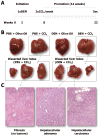The DEN and CCl4 -Induced Mouse Model of Fibrosis and Inflammation-Associated Hepatocellular Carcinoma
- PMID: 25181010
- PMCID: PMC4214366
- DOI: 10.1002/0471141755.ph1430s66
The DEN and CCl4 -Induced Mouse Model of Fibrosis and Inflammation-Associated Hepatocellular Carcinoma
Abstract
Human hepatocellular carcinoma (HCC) develops most often as a complication of fibrosis or cirrhosis. While most human studies of HCC provide crucial insights into the molecular signatures of HCC, seldom do they address the etiology of HCC. Mouse models are essential tools for investigating the pathogenesis of HCC; however, the overwhelming majority of cancer models in rodents do not feature liver fibrosis. Detailed in this unit is a protocol for an experimental mouse model of HCC that arises in association with advanced liver fibrosis. The disease model is induced by a single injection of N-nitrosodiethylamine (DEN) followed by repeated administration of carbon tetrachloride (CCl4 ). A dramatic potentiation of liver tumor incidence is observed following administration of DEN and CCl4 , with 100% of mice developing liver tumors at 5 months of age. This model can be employed for studying the molecular mechanisms of fibrogenesis and HCC development, and in cancer hazard/chemotherapy testing of drug candidates.
Keywords: cancer; fibrosis; genotoxic; liver; mechanisms.
Copyright © 2014 John Wiley & Sons, Inc.
Figures

References
-
- AACR Cancer Progress Report Writing Committee et al. AACR Cancer Progress Report 2013. Clin Cancer Res. 2013;19:S4–98. - PubMed
-
- Alkofer B, Lepennec V, Chiche L. Hepatocellular cancer in the non-cirrhotic liver. J Visc Surg. 2011;148:3–11. - PubMed
-
- Aravalli RN, Cressman EN, Steer CJ. Cellular and molecular mechanisms of hepatocellular carcinoma: an update. Arch Toxicol. 2013;87:227–247. - PubMed
-
- Bannasch P. Strain and species differences in susceptibility to liver tumour induction. IARC Sci. Publ; 1983. pp. 9–38. - PubMed
-
- Becker FF. Thioacetamide hepatocarcinogenesis. J Natl Cancer Inst. 1983;71:553–558. - PubMed
Publication types
MeSH terms
Substances
Grants and funding
LinkOut - more resources
Full Text Sources
Other Literature Sources
Medical

